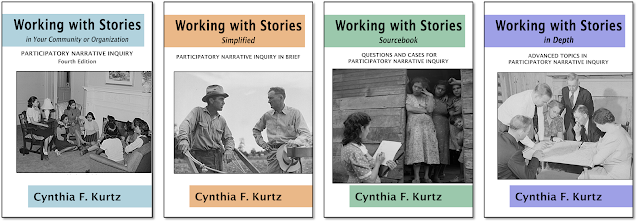I have updates for you.
Working with Stories is changing
I spent most of 2022 writing materials for my new PNI Practicum courses (about which more below).
- I wrote a "picture book" version of Working with Stories, one that says the same thing but with far fewer words and a lot more diagrams and photographs.
- I wrote a "story form library" of 36 question sets to suit a variety of PNI project goals.
Both of these resources have been appreciated by my students. However, I don't want to keep them behind a paywall. It's not how I do things. So this year, while running the courses, I have been working on getting the new materials out into the world.
I've been thinking about what people need when they are learning how to do PNI. And I've been thinking about what people have said to me about Working with Stories over the past eight years. Based on what I have learned, I think WWS wants to be four books:
- the original book (trimmed and updated)
- a shorter, simpler version (the picture book)
- a resource library (story forms and case studies)
- a book with abundant details (for the nerds who want everything)
So that's what I'm working on - when I'm not working on the courses that are going on right now, that is.
I think it's going to take me at least several months to get all of
these books ready to publish. So I decided to put them up in draft form now while I work on
finishing them. You can find the new books on the More page of the WWS web site.
These are the new book cover designs (so far). Coincidentally, the original book has four pictures on the cover. It's almost like WWS knew it wanted to be four books before I did.
So: have at the new stuff, and please send feedback.
The PNI Practicum courses are changing
The PNI Practicum courses
are going very well. People are doing lots of wonderful projects, and
we are all learning and making useful mistakes together. For myself, I
have learned a lot about how to give online courses (well, how not to give online courses; but that works too). So my next set of courses (starting in July) will incorporate many changes.
Some changes have to do with what will happen in the course.
- Calls will be recorded. I wasn't sure if people would want to
be recorded in our course meetings. Turns out they do. So, all Zoom calls are now
being recorded and are available to all students for review as long as
the course goes on. So if you miss a call, you can see and hear what
happened in your absence.
- We will use Miro. I had
wanted to show people that you can use a variety of online tools to
facilitate interactive sessions. But Miro is so much better than every
other option that I'm switching to it entirely.
- Students will make presentations.
To give people better opportunities to practice selling PNI to
their participants and funders, in the next set of courses, each student will be
asked to make two brief presentations to the class.
- Early on, each student will pitch their chosen project as if they were soliciting approval for it and participation in it.
- At
the end of the course, each student will make a brief presentation on
what happened in their project: its goals, plans, challenges, surprises,
and outcomes.
Some changes will be
structural.
- There will be a mid-course break.
From now on, there will be a one-week break between parts 4 and 5
(weeks 8 and 9) of each course. This will help people catch up if they
have fallen behind, and it will give us all a spring or fall break.
- One meeting time will be different. In the next courses, our Zoom calls will happen at 1700 and 2100 (was 2300) UTC. This should help when people in farther-apart time zones want to be on the same calls.
Some changes will be to the course requirements.
- NarraFirma will be required in the II-level course. I had been making a special effort not
to require the use of NarraFirma, in case people wanted to use other
things. However, all of my students thought I should require everyone to use NF, so everyone can learn how to use it together. So now, if you want to take the PNI
Practicum II course, you will need to use NarraFirma. (The I-level course still requires no particular software.)
- Course fees will need to be paid two weeks ahead. To avoid
last-minute scheduling difficulties, anyone who wants to take either
course must pay the full course fee two weeks before the course starts.
And finally, I have made some changes to how I will promote and manage the courses.
- The course syllabi will be available to review before you sign up. I
have posted
the syllabi for the two courses on the PNI Practicum web site, so you
can see what is going to happen in each part of each course.
- Refunds will be pro-rated. If you need to drop out of a course for any reason, I will refund your course
fee on a pro-rated basis, counting how many weeks you have attended (and not
counting the first week, which is covered by the nonrefundable
deposit). However, I ask people not to take the course (or dropping out) lightly, since dropping out will affect the peer learning experiences of everyone else in the course.
- There will be a new 6-student minimum.
If either course does not have at least six people signed up (and paid in full) by the
time the course fee is due, the course will not run, and I will send out
refunds (including of deposits) to those who have signed up.
- There might be an extra course. If either course fills up completely and people still want to take it (if that happens to you, tell me), I
will open up one more course of that type. If at least 6 people want to
take that course, I will give it.
If you have any questions about the PNI Practicum courses, or if you have any suggestions about
Working with Stories, reach out via email (cfkurtz@cfkurtz.com).


